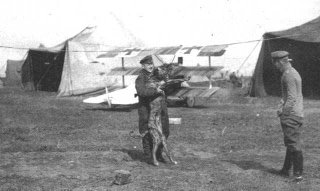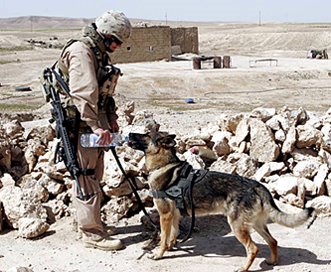
Moritz would lose part of an ear to a propeller while chasing airplanes.
After the war Duncan returned to California with Rinty. At a dog show in 1922, Rin Tin Tin was discovered. He would make twenty-six pictures for Warner Brothers and become a leading star of the silent screen. Rin Tin Tin's movies have been credited with saving Warners Brothers from bankruptcy.
While Rin Tin Tin is the most famous, soldiers have always kept mascots. During the Western Indian wars officers and men would bring along their dogs both for company and hunting.
It was Alexander Woollcott's classic tale Verdun Belle which dramatized what a little "lady" could do for the morale of men in impossible, desperate situations.
With this history in mind Central Command's General Order 1-A is far too draconian and is actually detrimental to morale:
General Order 1A is designed to prevent this type of situation from occurring among service members. It prohibits service members from adopting, as pets or mascots, caring for or feeding any type of domestic or wild animals... Stray Animals are to be Shot or Poisoned.
The United States Humane Society has offered its help to insure that mascots are properly vaccinated and do not carry disease. A letter from the president of the HSUS was unanswered by Secretary Rumsfeld. The position of the HSUS is incontrovertible:
During the Civil War, it was Sallie, Jack, Grace, Old Harvey, York, and Major. During World War I, it was Blanco, Joffre, Queenie, Smoke, Stubby, and Verdun Belle. Today, in the distant war zones of Iraq, it’s Bashur, Lava, and Ratchet. They are the dogs of war, pets and mascots of American soldiers who have rescued and cared for animals trapped in the chaos and tumult of human conflict.
Already, however, the biographies of Bashur, Lava, and Ratchet read differently than those of their storied predecessors. That’s because the pets and mascots of Baghdad and Fallujah are fugitives—escapees from a military order that requires the killing of animals harbored by American soldiers in combat zones. The goodhearted service members are no less culpable in the eyes of military brass; those who breach the policy on pets face the threat of serious punishment, including reduction in rank and court-martial.
An army may march on its stomach, but it survives on its morale. Whatever its motivations for the confiscation and killing of animals, our government should do more to reconcile the imperatives of public health and safety with the humane instincts of its military personnel. The keeping of animals by soldiers is an American tradition, one that should be honored and celebrated. In this sense, GO-1A is a grim “about-face.”
The military, of course, uses working dogs for various purposes. Now the brass needs to rethink its policy and acknowledge the usefulness of mascots to unit morale.

U.S. Marine Corps Sgt. Thomas R. Gehring gives his military working dog Horst a drink of water during a search in the Al Anbar province of Iraq May 6, 2006. Gehring is a K-9 handler with Apache Company, 4th Battalion, 23rd Infantry Regiment. Photo by U.S. Marine Corps Lance Cpl. Ben J. Flores
Crossposted at The Dougout.
5 comments:
Fascinating. Love the picture of the old German biplane.
Hey Grant, The photo in this post is too big for the IBA margins, and it sent the ever important Infidel Babe of the Week down to the bottom of the page.
Could you readjust the size?
Thanks.
Sorry, I hope that is better. I do get carried away with my airplane and doggie pictures. :-)
:)
I understand.
Thanks for fixing that.
Muslims hate dogs. All the more reason to consider dogs our best friends.
Post a Comment